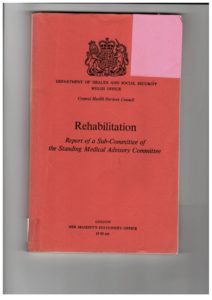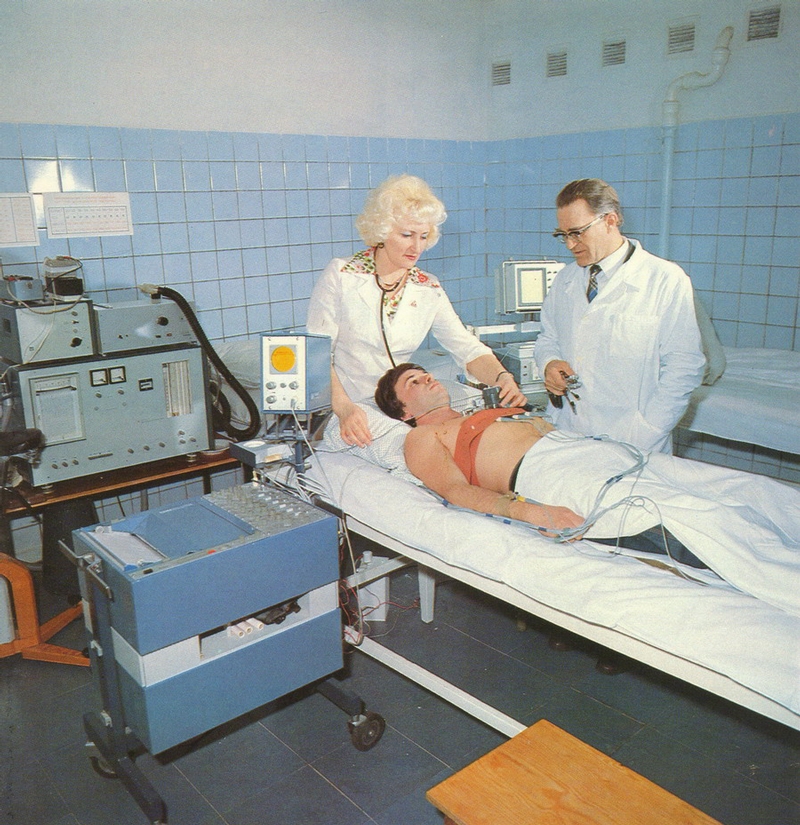In the late 1960s and early 1970s, Physiotherapy in the UK suffered several setbacks on the road to professional autonomy. This was very disappointing for physiotherapy in the UK, particularly given the developments which took place in the late 1950s and early 1960s with the advent of Government and public recognition through the implementation of the Professions Supplementary to Medicine Act resulting in State Registration.
The Tunbridge Report – proposals for strengthening medical dominance
 In May 1968 the Central Health Services Council set up a sub-committee on rehabilitation “Rehabilitation, Report of a sub-committee of the Standing Medical Advisory Committee – Tunbridge Report, the result of which was to be published in 1972. The brief of the sub-committee under the chairmanship of Professor Sir Ronald Tunbridge OBE. MSc.MD.FRCP.JP. was “to consider the future provision of rehabilitation services in the NHS, their organisation and development, and to make recommendations”. The members of the committee were all doctors, sixteen in total; there was no representation from the remedial professions (at that time, physiotherapy, occupational therapy and remedial gymnastics were collectively known as “Remedial Professions” in the UK.
In May 1968 the Central Health Services Council set up a sub-committee on rehabilitation “Rehabilitation, Report of a sub-committee of the Standing Medical Advisory Committee – Tunbridge Report, the result of which was to be published in 1972. The brief of the sub-committee under the chairmanship of Professor Sir Ronald Tunbridge OBE. MSc.MD.FRCP.JP. was “to consider the future provision of rehabilitation services in the NHS, their organisation and development, and to make recommendations”. The members of the committee were all doctors, sixteen in total; there was no representation from the remedial professions (at that time, physiotherapy, occupational therapy and remedial gymnastics were collectively known as “Remedial Professions” in the UK.
The Tunbridge Committee worked in association with a further group “the Committee on the Remedial Professions” which had been appointed in 1969 by the Secretary of State for Social Services and the Secretaries of State for Scotland and Wales. At this time Scotland and Wales did not have devolved governments. The remit of this committee was “to consider the function and relationship of OT, Remedial Gymnasts and Physiotherapy in the NHS, their relation to other personnel concerned with rehabilitation and the broad pattern of staffing required, and to make recommendations”.
In order to maintain close co-operation between the two committees, 4 members of the Tunbridge committee were also on the committee on the remedial professions.
Physiotherapists were very disappointed by the recommendations of the Tunbridge Committee as the report served only to reinforce the old dogma emphasising the dominance of the medical profession in the management, supervision and clinical role of physiotherapy. There were many statements throughout the entire report which argued for the continuing supremacy of the medical profession over physiotherapy and the services provided.
For example:
“We propose that each hospital Board or equivalent authority should appoint a regional medical adviser in rehabilitation, supported by an advisory committee to ensure that adequate and effective rehabilitation services are established throughout the country…we do not think that rehabilitation needs to be the prerogative of physical medicine and rheumatology. We believe the consultant from any clinical speciality with the interest, the necessary post-graduate training in rehabilitation and the normally accepted qualifications could be in charge of rehabilitation departments and should be called consultants in rehabilitation.” (DHSS 1972).
These comments set the tone of the whole report as it related to physiotherapy services. In their deliberations on who should be in charge of rehabilitation services the Tunbridge Committee came to the conclusion:
“It is clear that this person must be a consultant; rehabilitation is concerned with the clinical problem of the management of disability and the organisational problem of the management of remedial staff and the rehabilitation department. One clinician (doctor) must assume responsibility for rehabilitation and be able to vary the treatment programme according to the patients changing needs in consultation with the appropriate consultant. In the immediate future the most likely sources of heads of department will be from the ranks of consultants in physical medicine and rheumatology.” (DHSS 1972).
On the question of how rehabilitation departments should be organised and who should be in charge of them, the report continues:
“The consultant will have overall managerial responsibility for the rehabilitation services and will decide how the general day-to-day running of the rehabilitation should be organised according to local circumstances. We recommend that delegation of responsibility for day-to-day treatment of patients should be permitted to members of the remedial professions, provided that they are always under the supervision of the appropriate consultant” (DHSS 1972).
The consultant for rehabilitation (with responsibility for remedial services) would be responsible for; planning the general programmes of rehabilitation of patients, organising facilities for the assessment of social, vocational and clinical aspects of disability and the reasonable deployment of all remedial staff from most senior therapist to “aide”.
It is clear from these quotations and much else in the report that physiotherapists were again being regarded as technicians to be totally organised, managed and clinically supervised by consultant medical staff. Physiotherapists would have little – if any – managerial responsibility for even the day-to-day running of the departments in which they worked. Their clinical practice would be totally dictated by prescriptions laid down by consultants, who would be in a position of complete control of rehabilitation services even as far as physiotherapy techniques and everyday practice were concerned. This would be reflected in a system of training under which physiotherapy students would be taught only those techniques and practices likely to be prescribed by the consultants, however inappropriate such methods might have been. As a result, there would be no evaluation of practice and no encouragement of research; the physiotherapists would assume the role of “handmaidens” to the medical profession.
Physiotherapists had achieved a degree of autonomy as an occupational group with the advent of the Professions Supplementary to Medicine Act some 12 years before the publication of the Tunbridge Report. It is therefore understandable why the publication of this report came as a severe disappointment to the physiotherapy profession, to say the least.
If the Tunbridge Report had been fully implemented, the physiotherapy profession would have been placed in a position similar to that which pertained at the time of the Cope Report (see March 2020 RJJ article) some twenty years earlier.
The Committee on the Remedial Professions – Recognition of Relationship, Needs and Aspirations
The recommendations of the Committee on the Remedial Professions – which was in operation at the same time as the Tunbridge Committee – were published in the form of a brief statement rather than a Department of Health Report.
In July 1971 Sir Keith Joseph (Secretary of State for Social Services) asked for this committee’s advice “as soon as possible”. The chairman reported that they had considered matters not entirely within their terms of reference, although relevant to the problems under consideration, he, therefore, proposed that in order to avoid further delay a brief statement of the Committee’s views should be published.
The remit of the Committee had been to consider the functions and inter-relationships of the three remedial professions. There were thirteen committee members of whom only six were from the remedial professions. The Statement highlighted problems in the relationship between the medical and remedial professions and recognised the dominant and leading role of medical professionals:
“While the doctor must retain responsibility for the patient and for the prescription of treatment, more scope could and should be given to the therapist in the application and duration of treatment prescribed…many physiotherapists feel obliged to give treatment they consider to be inadequate and ineffective, either because the treatments are not sufficiently intensive, or because they are primarily palliative.” (DHSS 1972).
The Statement expressed the need for the provision of representation from the remedial professions on advisory committees at both regional and area levels so as to ensure participation in policy formulation and decision making as these affected their activities. The need for research into the treatments and techniques used by the remedial professions was acknowledged, as were the differing roles of the three remedial professions. The role of the domiciliary therapist was emphasised and the setting up of a career structure in which there were more senior posts within clinical, research and teaching responsibilities was recommended.
The Tunbridge Report had re-stated old ideas on the dominance of the medical profession over physiotherapy. However, the Statement of the Remedial Professions Committee, while recognising some aspects of this, had made positive recommendations on; representation, research, career structure, domiciliary therapy and the opportunity for therapists to decide on the application and duration of treatments. If these recommendations were accepted, a further step towards autonomy would be achieved. The remedial professions – through their committee representatives – played a key role in the production of the Statement which would not have been published without sustained pressure from them.
References
Jones R.J 1991. Management in Physiotherapy. Radcliffe Medical Press Ltd. Oxford
Jones R.J. 1987 “The Development of Physiotherapy management in the NHS” chapter in Chartered Physiotherapists Sourcebook. Parke Sutton. Norwich U.K


Medical practitioners operating at the elevated position of government committees have always in the past been representatives of their Trade Union, focused on maintaining their pre-eminent position in the health care system for social and financial gain.
Their representative bodies have been seen by government as the sole experts in health matters due to their financial and emotive strength to influence government opinion.
Given the Tunbridge Report above, why would the medical practitioners on the Committee make the ridiculous inference that it was appropriate for a pathologist or obstetrician to head a Rehabilitation department. Was the answer because they knew they didn’t have a sufficient number of rehabilitation physicians available but they were not going to open the door to to any other profession.
Thank goodness the ancillary, paramedical, aides, therapists, rehabilitation professions and worst of all “handmaidens” have managed, in some countries to turn this around one battle at a time over the last 50 years.
Rod Farr
Hi Rod. Thanks for your comment. I’ve passed it on to Rob who will reply shortly, I’m sure.
Dave Nicholls